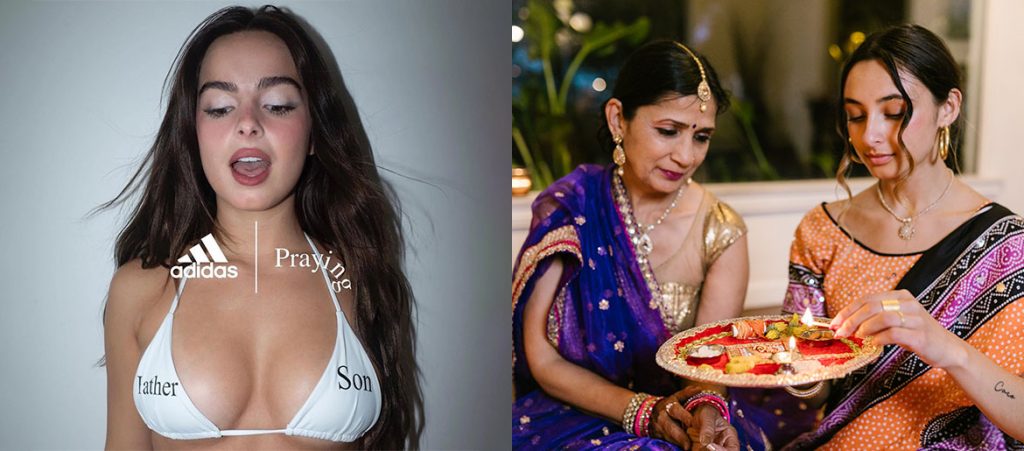
Generation Z has a well-earned reputation as the most inclusive generation ever, but at first glance it seems this barrier-shattering acceptance does not extend religion. I understand why: we see the horrific abuses committed by the Catholic church and other organised religions in the news, we watch cult documentaries, we listen to people discuss their religious trauma online.
As someone who grew up in a multi-faith household — mum is Sikh, dad is Hindu — faith and religion were a big part of my upbringing. It is an important part of my life to this day, something I’m sometimes embarrassed to admit because of the (often valid) bad reputation religion has. That embarrassment is quickly followed by guilt at betraying myself. As a young person of faith, I struggle with wanting to share who I am, whilst not coming across as ‘preachy’, and still be considered intelligent. It leaves me with an uncomfortable question to ask and answer: Will Gen Z accept me if I am religious?
How we learn what religion means
From a young age we’re taught to never bring up sex, politics or religion. I understand why our parents and their parents insisted on this rule – religion can be extremely triggering and difficult to talk about. What should be a healing and safe space too often provides cover for horrific discrimination, condemnation and abuse.
Unfortunately, it’s not uncommon for faith leaders to weaponize scripture and religion, causing deep damage. Abuses, cover ups and discrimination have equated “being religious” with being ignorant and unintelligent in the eyes of many. As a queer woman of faith, I am in full favour of exposing harm done to any group or individual. Scrutiny of any powerful institution is necessary, but when this is received by those outside the faith it can create an unintentional wedge, branding us all as supporters or active participants.
Gen Z is quick to shutdown stereotypes that misrepresent different communities, but less so when it comes to people of faith. Our reference points for religion are the extremes covered in media and pop culture: extremist American churches; wealth-obsessed Pentecostalism; Islamic terrorism; karens protesting abortion clinics; Tom Cruise and his Scientology; men forcing women to wear hijabs. The Islamophobia wrapped up in faux-feminist concern for hijabis is a whole other essay…
In Australia, our Anglo-centric perspective also colours how we think about and understand religion. Most Western religions view the absolute as ‘beyond’ and ‘other’; there is usually a set of everyday guidelines to follow in order to achieve saviour. On the other hand, many Eastern religions envision the ultimate as something that is more intimate, found within. Contrary to what our colonisers and some people today think, our practices and rituals are not foolish or barbaric but integral to our way of life: sitting on the floor and eating with our hands is to practice equality; ‘sewa’, a key principle in Sikhism, literally means service. I was taught that to live happily we should incorporate acts of service into our lives. When I was growing up, attending gurdwara (Sikh place of worship) meant lining up everyone’s shoes outside or helping serve food. As part of our funeral rituals we donate food or money to the needy. There are whole festivals – not only in Sikhism but also Hinduism, Buddhism, Zoroastrianism – devoted to doing service for others. In my experience, Eastern religions are less formally structured, and more intertwined within culture. It’s less a set of rules, and more a set of values to live life by.
But still, when I say “I’m religious” to a new friend, their cultural reference points paint only one picture: that I’m being held against my will, forced by my parents to attend Gurdwara or a Mandar (Hindu temple) as I await my arranged marriage. It’s important that we deconstruct those preconceived notions before writing off anyone ‘dumb enough’ to follow a religion.
@donnellwrites Today I’m grateful for indigenous perspectives on spirituality that have helped to set me free: this is probably the main one of them. It helped me to realize that my “religion” was always Love. Share a thought, leave a comment. #decolonize #nativetiktok #deconstructingchristianity #spirituality ♬ original sound – Donnell
Spirituality vs Religion
While there are definitely some people who will outright shut you down, others are shifting the conversation in a different direction. It’s become much more common to hear people say: “I’m not religious, but I am spiritual.” I’d be lying if I said I fully understood what that meant, or what the difference is.
For Gen Zs, it’s understandable we want to pushback against the Big Systems that have boxed in our lives. In less than 25 years we’ve stared down the darkness of the pandemic, the despair of climate change, the fear of an incoming recession. We know that the powerful establishment of political and economic institutions are not going to save us, and we intend to do something about that. The distrust extends to religion, so deeply intertwined with powerful institutions, and makes exploring non-traditional beliefs more appealing.
At the same time young people still crave the things organised religion may have provided for our parents and grandparents. We still want something to believe in, a sense of community, guidance, purpose and meaning. The lack of exposure to what religion actually looks like fitting into one’s everyday life – as opposed to you hear on the news – further encourages young people to look for those benefits elsewhere. My peers just don’t believe they will find those things in mainstream religion, which is why spirituality is such an appealing alternative.
Being spiritual-but-not-religious lets you pick and choose what you’re comfortable with. The unsolicited tarot readings on TikTok are most direct about this, literally telling you: “Take what resonates, leave what doesn’t”. As someone who definitely wants to leave my exes in the past, the emphasis of choice really drew me to this kind of spiritual practice. Anything can be guidance, anything can be spiritual if it means something to you. Crossfit communities, football teams, the Taylor Swift Cinematic Universe – these things can all provide the community, purpose, meaning and guidance that religion does.
It’s curious that Gen Z don’t view religion as working the same way; as a practice that allows you to skip the elements that don’t serve who you are. I have queer, Catholic friends who resonate more with the saints rather than the concept of God. I have Hindu cousins who like the principles of the religion, but have more monotheistic beliefs. Those stances might seem controversial or incompatible to some, but it doesn’t matter – religion and spirituality are personal journeys.
The misconception that people who are part of a religion are a monolith and all think the same way is, obviously, problematic. The idea that there is not progressive or positive way to be religious is what allows extremists – religious or not – to dominate the conversation and make it toxic. By feeding stereotypes and drowning out more positive and nuanced experiences, like mine, young people are put off exploring something that could provide the sense of peace, community and guidance we’re yearning for.
It’s for this reason that most of the conversations I have about faith start with someone else bringing up the topic, not me. It’s for this reason that, sometimes, in conversations that I’m in, other people will feel comfortable to ridiculing another person of faith behind their back. The things I’d love to say: why can we find nuance in almost every other situation, except for this? How is personal religion different to never missing a Sunday at F45, living and dying by the Rabbitohs, or pulling tarot cards with your bestie? Is it so terrible that this person is searching for their peace of mind?
I can’t, or won’t, say these things, though. I’m still not comfortable that it might be interpreted as defensive, not assured that it won’t make people think differently of me. I’m still on my own journey with faith.
I’m not convinced that my fellow Gen Zs will ever fully accept my willing, loving participation in religion. But I know they can relate to the vulnerability in exploring an aspect part of my identity, and sharing it. Feeling the fear and importance of letting others know you. Being embarrassed for feeling embarrassed. Part of me will probably always be scared to talk about it, but I’m hopeful that sharing my experience encourages us to truly be the accepting, inclusive generation we’re hyped up to be.




Comments are closed.